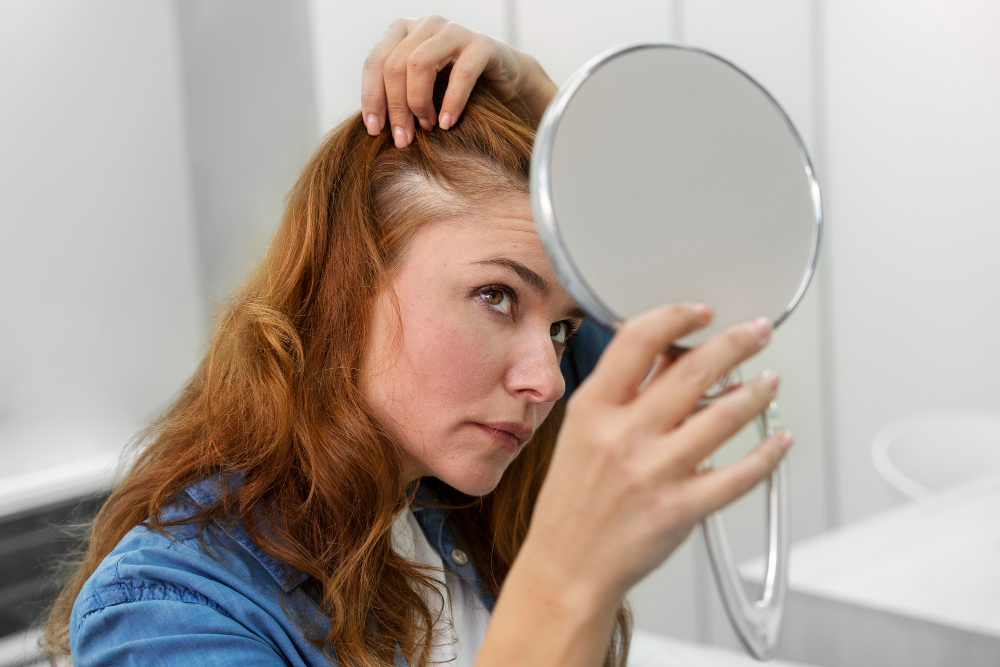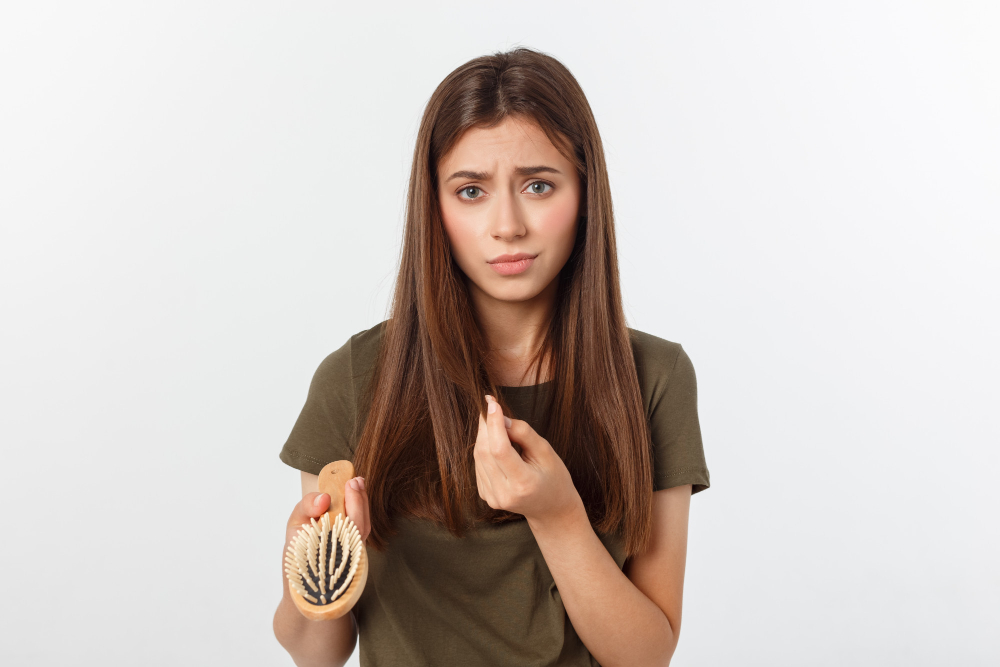What Causes Hair Thinning and What You Can Do?

Understanding Hair Thinning
What is hair thinning?
Hair thinning is a gradual reduction in hair volume and density, often seen as a widening part line, a less full ponytail, or more visible scalp. Unlike complete hair loss or baldness, thinning hair typically means that the hair is still growing, but in smaller diameter strands or slower cycles. This condition can be temporary or progressive, and it affects people of all ages and genders.
Hair thinning doesn’t necessarily mean permanent damage. In many cases, the hair follicles remain intact and capable of producing healthy strands again—provided the root causes are addressed early. That’s why recognizing thinning as a signal rather than a verdict is critical for prevention and recovery.

How hair growth works?
To understand why thinning happens, we need to look at the natural hair growth cycle, which consists of three main phases:
- Anagen (growth phase) – This is when hair actively grows. It lasts 2 to 7 years, depending on genetics.
- Catagen (transitional phase) – Lasting about 2 to 3 weeks, this brief period marks the end of active growth.
- Telogen (resting/shedding phase) – This stage lasts around 3 months. Hair stops growing and eventually falls out to make way for new strands.
At any given time, about 85–90% of the hair on your scalp is in the anagen phase. Disruptions in this cycle—especially those that push hairs prematurely into the telogen phase—can lead to excessive shedding and visible thinning.
Several internal and external factors influence this cycle. For example, nutrient deficiencies, stress, or hormonal changes can shorten the growth phase or lengthen the resting one. This is why hair health is often a mirror of your overall health.

Most Common Causes of Hair Thinning
Hair thinning rarely stems from a single issue—it’s usually the result of several overlapping factors. Understanding the most common causes helps pinpoint which areas need attention first.
Hormonal imbalances
Hormones play a central role in regulating the hair growth cycle. Disruptions can push hair into the resting (telogen) phase too early, causing it to shed prematurely. Common hormonal triggers include:
- Thyroid dysfunction – Both hypothyroidism and hyperthyroidism can lead to thinning hair.
- Polycystic ovary syndrome (PCOS) – Often leads to elevated androgens, which can shrink hair follicles.
- Menopause – Estrogen levels drop, which affects hair density.
- Postpartum hormonal shifts – Many women experience temporary hair loss a few months after giving birth.
These hormonal fluctuations can be diagnosed with blood tests and often managed with lifestyle changes, medication, or supplementation.
Nutritional deficiencies
Hair follicles are among the most metabolically active parts of the body, which means they need a constant supply of nutrients to grow strong and thick hair. When your diet lacks key nutrients, your hair is often one of the first areas to suffer.
Important nutrients for hair health include:
- Iron – Iron deficiency is a common cause of diffuse hair thinning, especially in menstruating individuals.
- Zinc – Crucial for DNA and protein synthesis in the follicle.
- Vitamin D – Helps regulate the growth cycle and follicle function.
- Biotin (Vitamin B7) – Often linked to brittle hair and nails when deficient.
- Protein – Hair is made of keratin, a structural protein; insufficient intake weakens hair growth.
Even a “healthy” diet may not be enough if your body can’t absorb nutrients efficiently due to gut health issues.

Stress and lifestyle factors
Stress triggers the release of cortisol and other inflammatory chemicals that can disrupt the hair cycle. Chronic stress may lead to a condition called telogen effluvium, where large numbers of hairs enter the resting phase and shed simultaneously.
Lifestyle habits that can contribute to thinning include:
- Lack of sleep
- Crash dieting or extreme calorie restriction
- Overtraining or physical burnout
Supporting your nervous system with adequate rest, gentle exercise, and adaptogenic herbs may help reduce this impact.
Gut health and digestion
Emerging research highlights the connection between the gut microbiome and overall hair health. When your digestive system is out of balance, it affects nutrient absorption and can lead to chronic inflammation, both of which negatively impact hair follicles.
“We now know that a healthy gut environment supports not only digestion, but also skin and hair health through improved nutrient bioavailability.”
— Dr. Will Bulsiewicz, MD, board-certified gastroenterologist and author of “Fiber Fueled”
People experiencing frequent bloating, constipation, or food sensitivities may unknowingly struggle with nutrient absorption—ultimately affecting their hair. This is where probiotic support, such as from Bioma’s Weight Loss Gummies, can help restore gut balance and improve the way your body nourishes your follicles.

Medical conditions and medications
Certain medical conditions and pharmaceutical drugs are known to cause hair thinning. These include:
- Autoimmune diseases such as alopecia areata or lupus.
- Chemotherapy and radiation therapy.
- Antidepressants, beta-blockers, or blood thinners.
- Diabetes and other chronic conditions that affect circulation or metabolism.
In these cases, the thinning is often reversible after adjusting treatment or addressing the underlying health issue.
Genetics and age-related factors
Sometimes, hair thinning is simply a part of your genetic blueprint. Androgenetic alopecia (commonly called female or male pattern hair loss) affects a large portion of the population and becomes more visible with age.
While genetics can’t be changed, many people find success slowing the process with nutritional support, topical treatments, and lifestyle changes.
Hair care habits and environmental damage
Finally, how you treat your hair daily can also contribute to thinning:
- Excessive heat styling or chemical treatments
- Wearing tight ponytails or buns
- Using harsh sulfates or drying shampoos
- Exposure to pollution and UV rays
Gentler care routines and protecting the scalp environment can significantly reduce breakage and promote healthier regrowth.
Is Your Hair Thinning Linked to Gut Health?
1. Do you experience frequent bloating, gas, or constipation?
YesNo
2. Do you feel tired or sluggish even with enough sleep?
YesNo
3. Has your hair noticeably thinned over the last 6 months?
YesNo
4. Do you often crave sugar or processed carbohydrates?
YesNo
5. Have you recently taken antibiotics, acid blockers, or antidepressants?
YesNo
6. Have you been diagnosed with low iron, vitamin D, or B12 levels?
YesNo
7. Do you frequently feel stressed or overwhelmed?
YesNo
8. Has your diet lacked fruits, vegetables, and fiber-rich foods?
YesNo
9. Are you experiencing hormonal changes (e.g., postpartum, menopause, PCOS)?
YesNo
10. Do you often notice brittle nails or dry skin alongside thinning hair?
YesNo
What You Can Do to Address Hair Thinning
While hair thinning can be distressing, it’s often manageable—especially when addressed early. A multifaceted approach targeting internal health, nutrient support, and gentle care often yields the best results.
Improve your diet and gut health
Hair health starts from within. A nutrient-rich diet is essential, but it’s only effective if your body can actually absorb those nutrients. Many people experiencing hair thinning have underlying gut dysbiosis—an imbalance in the microbiome that leads to poor digestion and inflammation.
Tips to support diet and gut health:
- Eat a variety of fiber-rich, colorful vegetables
- Incorporate fermented foods (like sauerkraut or kefir)
- Drink enough water to support circulation and detoxification
- Avoid ultra-processed foods and refined sugar
Probiotic support can play a key role here. Bioma’s Weight Loss Gummies are formulated not only to support weight regulation but also to improve gut function by supplying prebiotics and postbiotics. These compounds feed beneficial bacteria and help regulate digestion—leading to better nutrient absorption.
“When my digestion improved, I started noticing less hair fall within just a few weeks. I didn’t even realize my gut health was linked to my hair.”
– Laura J., 36, Bioma customer
Balanced gut flora means your body is better equipped to use iron, zinc, and other key vitamins that directly impact hair strength and growth.

Consider targeted supplements
Even with a healthy diet, some people may benefit from additional support through supplementation. Before beginning any supplement regimen, it’s best to consult a healthcare provider and get blood tests if possible.
Key supplements for hair include:
- Biotin – Often referred to as the “hair vitamin”; supports keratin production.
- Collagen peptides – Provide structural proteins needed for strong strands.
- Iron and ferritin – Especially important for menstruating individuals.
- Vitamin D – Helps regulate the hair follicle growth cycle.
- Omega-3 fatty acids – Reduce inflammation and support scalp health.
While no supplement is a magic fix, the right combination can enhance the results of your lifestyle changes.
Reduce stress and support hormone balance
Stress is a major—but often underestimated—culprit in hair thinning. It impacts hormone production, digestive function, and inflammation levels. Reducing chronic stress can help normalize the hair growth cycle.
Supportive practices include:
- Daily mindfulness or meditation
- Adaptogens such as ashwagandha or rhodiola
- Consistent, restful sleep
- Balanced exercise routines (avoid overtraining)
For those dealing with hormonal issues like PCOS or menopause, working with a hormone specialist may be necessary to stabilize levels that affect hair density.
Use scalp-friendly products and treatments
Topical care also matters. Many mainstream hair products contain ingredients that strip the scalp or clog hair follicles. Instead, opt for:
- Gentle, sulfate-free shampoos
- Scalp exfoliants or detox treatments once a week
- Light oils like argan or jojoba to nourish ends
- Minoxidil (topical) if prescribed by a doctor
Scalp massages have also been shown to improve blood circulation, which supports follicle health.
Consult a doctor or dermatologist
If hair thinning persists despite lifestyle adjustments, it’s important to consult a professional. A healthcare provider can:
- Conduct blood work to assess iron, thyroid, and vitamin levels
- Rule out autoimmune or endocrine disorders
- Prescribe medications or topical treatments if needed
- Refer you to a dermatologist or trichologist for specialized care
Hair thinning can be reversible when the right causes are identified and addressed.
Can gut health really affect hair thinning?
Yes, your gut is responsible for absorbing the nutrients your hair follicles need. When your digestive system is imbalanced—due to poor microbiome health, inflammation, or low enzyme levels—your body may not absorb key vitamins like iron, zinc, or B12. This can lead to hair becoming thinner, weaker, and more prone to shedding.
How long does it take to see results after addressing the root causes?
Hair grows in cycles, and changes take time. Most people notice visible improvements in thickness or reduced shedding after 8–12 weeks of consistent changes—such as dietary upgrades, probiotic use, or stress management. However, individual timelines may vary based on the severity and cause of hair thinning.
Are Bioma’s Weight Loss Gummies really helpful for hair health?
Yes, while designed primarily to support weight management, Bioma’s gummies also improve gut function thanks to their blend of prebiotics and postbiotics. A healthier gut supports better nutrient absorption, which is crucial for strong, healthy hair. Customers often report benefits beyond digestion, including clearer skin and stronger nails or hair.
What vitamins or nutrients should I focus on for hair growth?
Iron, vitamin D, biotin (B7), zinc, and protein are key for hair health. Deficiencies in any of these can impair the hair growth cycle. Omega-3 fatty acids and collagen are also beneficial for strengthening hair strands and reducing inflammation around the follicles.
Is stress a real cause of hair thinning, or is that a myth?
It’s absolutely real. Stress triggers hormonal changes and increases inflammation, both of which disrupt the hair cycle. Prolonged stress can lead to a condition called telogen effluvium, where large numbers of hairs prematurely enter the shedding phase. Reducing stress is an essential part of any hair recovery plan.
Can hair thinning be reversed completely?
It depends on the cause. If thinning is due to temporary factors like stress, poor diet, or post-pregnancy hormone shifts, it’s often reversible with the right support. However, genetic thinning (like androgenetic alopecia) may not be fully reversible but can still be managed and slowed significantly.
Related articles



